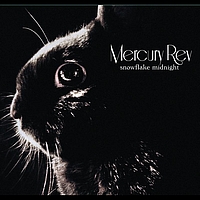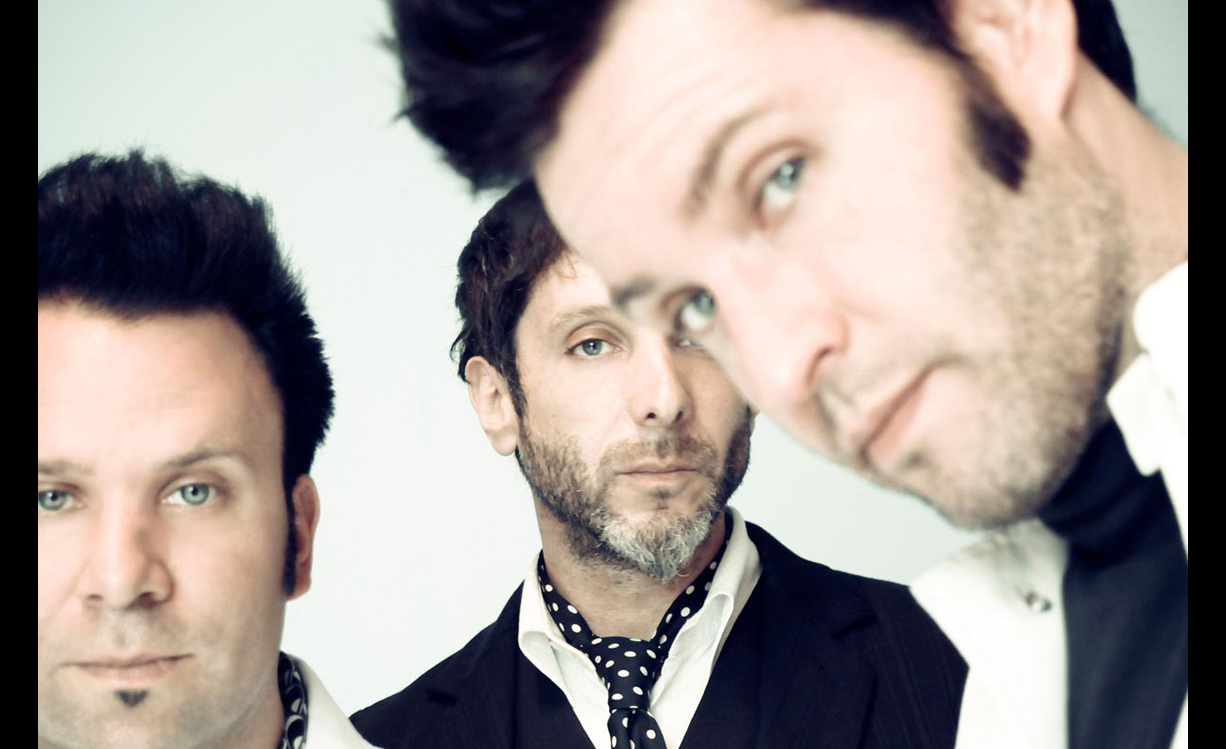 Mercury Rev: Snowflake Midnight (Yep Roc, 9/30/08)
Mercury Rev: Snowflake Midnight (Yep Roc, 9/30/08)
Mercury Rev: “Butterfly’s Wing”
[audio:https://alarm-magazine.com/wp-content/uploads/2011/05/02-butterflys-wing.mp3|titles=Mercury Rev: “Butterfly’s Wing”]Mercury Rev has never played by the rules, opting instead for a philosophy in which the basic rules of reality and consciousness are meant to be questioned. This aversion to the basic definitions and limits of rock and roll certainly has hurt the band commercially but has also garnered it a loyal cult following. The band’s 1991 debut album, Yerself is Steam, established its members as immediate critical darlings, and in 1998, the band seemed on the verge of super-stardom with the release of Deserter’s Songs, its most commercially successful release to date.
Although widespread public recognition continued to elude the group, the album served as a rekindling of spirits for a collective that was on the verge of implosion due to debilitating drug addictions and long-standing internal squabbling. The album was also a reflection of a group of men desperate to find themselves personally and artistically.
In addition to getting clean, the band signed to a new label (V2), assembled a new touring band in support of Deserter’s Songs, and through spiritual peace of mind finally tamed the reckless energy that had threatened to tear the band apart. With the widespread acclaim of The Secret Migration in 2005 and the recent release of Snowflake Midnight, the band is operating at full speed with a globe-trotting tour and a renewed belief in its skewed, idiosyncratic vision.
“It was a natural progression for us,” Sean “Grasshopper” Mackowiak says from the band’s studio in upstate New York, as he describes Snowflake Midnight. “Things were changing within the band, so the elements that made up the album just kind of fell into place that way. After Migration, I had started to play with different computer programs, and we broke out our old synth equipment. We were having so much fun playing with this stuff that we just started recording. With us, it usually works that if someone gets a new gadget, it sort of sparks the whole process of writing songs and making music.”
On Snowflake Midnight, the band delved headfirst into the electronic and ambient influences that have always been a part of its sound but have come to define its aesthetic in the last 10 years. Monstrous guitar outbursts have largely been replaced by digital ambiance and programmed beats, though the sound is still distinctly Mercury Rev. “It wasn’t until the last 10 years that software finally caught up with the sounds we wanted to make,” Mackowiak says.
Themes of rebirth and transformation permeate much of Snowflake Midnight, with songs “Snowflake in a Hot World” and “A Squirrel and I (Holding on…and then Letting Go)” capturing the trademark psychedelia and group mentality of an aging band coming to terms with its mortality.
“I think that the album reflects on the band as a whole and on each of us personally,” Mackowiak says. “Being in the band all these years, we’ve seen a lot of changes internally and externally. We’ve seen the music industry change and ourselves change. My father and [drummer] Jeff Mercel’s father both passed away during the making of Snowflake. At my age, you tend to wake up and reevaluate your life and where you’re headed sometimes.
“The hippie movement definitely grew out of the Beats, but I think that we share the cynical, questioning spirit of the Beats, and not the New Age hippie philosophy of ‘Everything is great; let’s smoke a bowl.’”
“For the most part, we were in a positive head-space during the writing and recording of the album. The past eight years have been really tough on the country, and now with the economy, it’s been tough on everybody, and I think one of the ways out of these depressions is music. It’s like the writings of [William S.] Burroughs, whose big themes were time and physical travel, drugs, sex, and music breaking through the fabric of everyday reality — not as a statement but as a philosophical question about reality. I think our music is a lot like that, as we try to poke holes through reality and the idea of ‘What is the music industry and what is rock and roll?’”
As a companion piece to Snowflake Midnight, the band has released Strange Attractor, another full-length album, as a free download through the band’s website. “A lot of the songs with lyrics became Snowflake, which we worked on with [engineer] Dave Friedman,” Mackowiak says. “And then Strange Attractor was stuff that we would work on in between, so Attractor became this kind of alternate-universe album we were working on in between Snowflake.”
Despite being available for free and conceived as a project between Snowflake Midnight sessions, the album is a fully realized vision, with eleven tracks of trippy, late-night goodness.
“It’s an instrumental mood piece, really,” Mackowiak says. “Releasing it for free was our little rebellion against commercialism. The Beat writers are definite influences on us. I live near Woodstock, as does most of the band, and lately it seems like a lot of people label us a ‘hippie’ band, and I don’t know where that comes from. We’re not really New Age or anything. A lot of our influences come from the travel writings of [Jack] Kerouac or [Allen] Ginsberg and the sort of transformation of spirit through your own senses. We don’t really buy into the New Age kind of hippie movement. The hippie movement definitely grew out of the Beats, but I think that we share the cynical, questioning spirit of the Beats, and not the New Age hippie philosophy of ‘Everything is great; let’s smoke a bowl.’”
Although the band has never shied away from the exploration of altered perceptions, when co-founder/vocalist/guitarist Jonathan Donahue’s experimentation with heroin quickly spiraled into full-blown addiction, it caused the band to splinter in the mid-’90s, following the release of See You on the Other Side in 1995.
In 1997, Donahue and Mackowiak reconvened in the Catskill Mountains to begin work on Deserter’s Songs, utilizing the neighboring talent of Garth Hudson and Levon Helm from The Band, who appear on the album. Deserter’s Songs was an attempt to reconcile long-festering bitterness, and a chance to examine the disparate personal journeys of the past two years. It was also an opportunity to try on a stripped-down, rootsier approach to music and strip away the psychedelic gluttony that had begun to clutter the band’s sound.
“Before the album, Jonathan and I had a real tension going on, and people were screwed up on drugs,” Mackowiak says. “Attending a Jesuit monastery was the chance to take myself out of the equation for a month. It was a chance to have daily tasks, but not really think about anything and clear my mind. What I got out of it was taking a timeout from music and clearing my mind of all clutter. You’re supposed to be doing prayers while you’re there, which I didn’t do, but they were very loose and open to all kinds of spirituality. I wasn’t really practicing meditation, but the isolation and removal from society was enough meditation.”
Mercury Rev has seen its share of success and failure, highs and lows, and everything that comes now is viewed as a bonus.
“Our first album, Yerself Is Steam, starting doing really well in the press when it came out, so we had to get together and play a show, and we’d never really played live,” Mackowiak says. “It all started happening so fast, and our second gig ever was The Reading Festival in front of 20,000 people. One of our first gigs was opening for Bob Dylan. I was pretty freaked out. This was the Dylan period when he was wearing sweatshirts with the hood up, and I’m on stage playing and I look over and there’s Dylan hanging in the wings, kind of hunched over, wearing the hood, and I just totally lost it.
“But all that early success just makes me realize how lucky we are. We’ve always felt like outsiders, and I think it’s because what we bring to rock is not just rock and roll. Our interest in jazz, Delta blues, and electronic is all valid for us, and in our over-exuberance, we try to cram it all into what we think is rock and roll. I think sometimes it’s helped us and sometimes it’s hurt us, but it’s what we do. Everything that’s happened to us after age 30 has been a bonus, because we all thought we’d be dead by 30. Every album and every tour is a bonus.”

